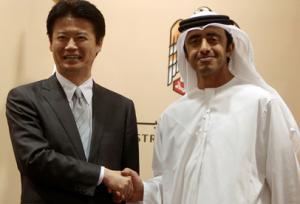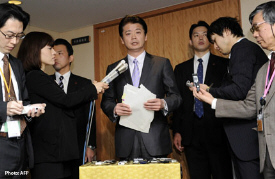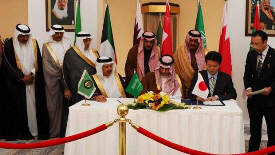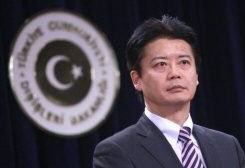Japan’s foreign minister, on a Gulf tour to seek assurances over oil supplies, said Tuesday that Tokyo was "very concerned" by escalating tensions with Iran and called for a diplomatic solution.
 Japan's foreign minister, on a Gulf tour to seek assurances over oil supplies, said Tuesday that Tokyo was "very concerned" by escalating tensions with Iran and called for a diplomatic solution.
Japan's foreign minister, on a Gulf tour to seek assurances over oil supplies, said Tuesday that Tokyo was "very concerned" by escalating tensions with Iran and called for a diplomatic solution.
The United Arab Emirates (UAE), meanwhile, gave assurances it would make up for a shortfall in oil supplies to Japan.
"Japan is very concerned about the latest developments," Koichiro Gemba said of the West's standoff with Tehran, which has threatened to block the strategic Strait of Hormuz if oil sanctions are imposed over its peaceful nuclear program.
"We believe that we should solve the problem diplomatically and peacefully. That is why dialogue with Iran should continue," the Japanese foreign minister told reporters in Abu Dhabi through an Arabic-language interpreter.
"Iran should not incite troubles, and nothing should affect security in the Strait of Hormuz," he said.
His UAE counterpart, Sheikh Abdullah bin Zayed al-Nhayan, said closing the Strait of Hormuz was not in anyone's interest, including Iran, but pointed to later statements from Tehran denying plans to bloc the waterway.
 "It is not in the interest of any side, be it member states of the Gulf Cooperation Council, Iran, the international community and energy prices, to talk about closing international passages, especially Hormuz," he said.
"It is not in the interest of any side, be it member states of the Gulf Cooperation Council, Iran, the international community and energy prices, to talk about closing international passages, especially Hormuz," he said.
Gemba said he asked the UAE for assurances to increase oil supplies to meet Japan's needs, as fears rise of sanctions on Tehran.
"We have asked for an increase in oil supplies that Japan needs," he told reporters when asked if he sought assurances from the UAE to help cover shortages resulting from a possible embargo on Iranian exports.
Thirty percent of Japan's oil supplies come from Saudi Arabia, with another 20 percent coming from the Emirates, 10 percent from Qatar and nine percent from Iran.
The minister has already made stops in Saudi Arabia and Qatar where he raised the same concerns.
Sheikh Abdullah said his country was willing to help meet Tokyo's needs in the event of energy shortfalls.
"As the UAE has the ability to provide more energy resources, it has taken the request positively. Japan will have the priority," he said.
Japan's needs for oil and gas have also increased after a massive earthquake and tsunami caused devastation and sparked a nuclear power crisis last March.
 The vast bulk of Japan's 54 nuclear reactors are now shut down, amid public distrust of the technology and calls for increased safety.
The vast bulk of Japan's 54 nuclear reactors are now shut down, amid public distrust of the technology and calls for increased safety.
Speaking at a Friday news conference, Japan's industry minister, Yukio Edano, said the world's third biggest economy was preparing for a potential Iranian oil embargo "by taking every possibility into consideration."
Saudi Arabia is seen as the only oil exporter capable of boosting production sufficiently to make up for a crunch in the global oil market.
The president of JX Nippon Oil & Energy, Japan's biggest petroleum refiner, expressed confidence in the ability of the world's largest oil exporter to raise output, in a recent interview.
"I think we can make do if we have months to spare," Yasushi Kimura told SankeiBiz digital news. "We have sounded out Saudi Arabia on what can be done" if the ban on Iran is implemented.
